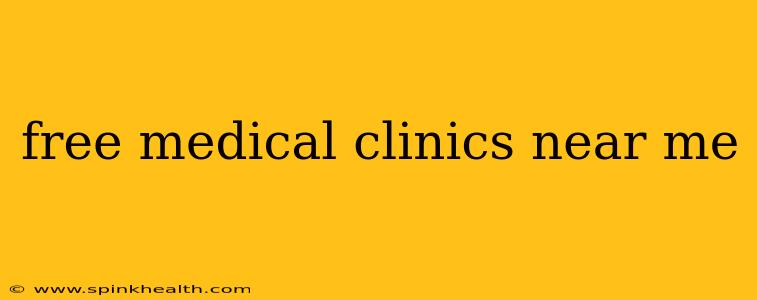Finding a Haven of Healing: Your Guide to Free Medical Clinics Near You
The unexpected illness, the nagging injury, the persistent cough – these health concerns can be daunting, especially when the cost of medical care looms large. But you're not alone. Across the country, a network of compassionate organizations provides free or low-cost medical care to those in need. This story is about how to navigate this vital resource and find the free medical clinic nearest to you that's the right fit for your needs.
My journey to understand this crucial network began with a simple Google search, just like yours. The results were a jumble of links, leaving me overwhelmed and unsure where to start. But I persevered, and what I discovered is a world of dedicated professionals offering a lifeline to individuals and families facing financial hardship. Let's break down how to find your lifeline.
How Do I Find Free Medical Clinics Near Me?
This is the most important question, and thankfully, there are several effective strategies:
-
Online Search Engines: Start with a simple search like "free medical clinics near me," "free healthcare clinics [your city/zip code]," or "community health centers [your location]". Be specific with your location – adding your city and state significantly refines the results.
-
United Way's 211 Helpline: Dialing 211 connects you to a vast network of local resources, including free and low-cost health clinics. This is a fantastic resource, especially if you're unsure where to begin your search.
-
Local Health Departments: Your local health department is an invaluable resource. Their websites often contain listings of local clinics, health programs, and community resources.
What Types of Services Do Free Clinics Offer?
The services provided vary between clinics, but many offer a broad range of essential care:
-
Basic Medical Care: This includes routine check-ups, treatment for common illnesses (like colds and flu), and management of chronic conditions (such as diabetes and hypertension).
-
Dental Care: Some clinics offer basic dental services, including cleanings, extractions, and fillings.
-
Mental Health Services: The increasing recognition of the importance of mental well-being means some free clinics also provide counseling and therapy services.
-
Prescription Assistance: While not always providing prescriptions directly, many clinics can assist in navigating programs that help reduce the cost of medications.
-
Other Services: Depending on the clinic and its resources, you may find services like vision care, women's health services, and even some specialized care.
What Are the Eligibility Requirements for Free Clinics?
Eligibility criteria vary significantly between clinics. Some focus on serving specific populations (such as the uninsured, the elderly, or low-income families), while others have broader intake policies. It's essential to check the individual clinic's website or contact them directly to determine their eligibility requirements. Generally, they will ask about your income, insurance status, and residency.
Are Free Clinics Safe and Reputable?
Most free clinics are operated by reputable non-profit organizations and staffed by licensed medical professionals. However, it's always wise to do some background research before your first visit. Check their website for information about their accreditation, licensing, and the qualifications of their staff. If you have any doubts, don't hesitate to contact your local health department or United Way for guidance.
What Should I Expect During My First Visit?
Your first visit to a free clinic will likely involve a registration process that gathers your personal and medical information. Be prepared to provide documentation such as identification, proof of income, and insurance information (if applicable). The clinic staff will assess your needs and create a treatment plan accordingly.
Finding a free medical clinic shouldn't feel like navigating a maze. By using these resources and following these tips, you can find a supportive healthcare provider to address your immediate and ongoing health needs. Remember, seeking help is a sign of strength, and there are resources available to ensure you receive the quality care you deserve, regardless of your financial situation.

